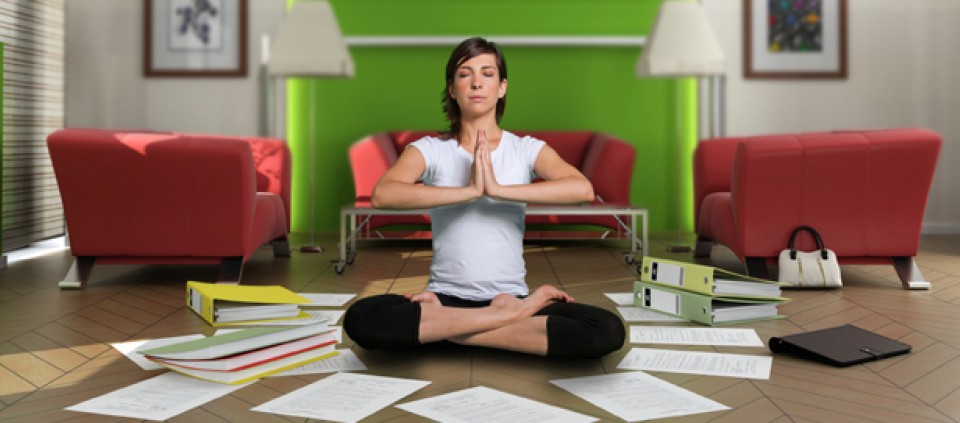Be Clear Now: Getting Rid of the Clutter

Clearing out a home office space? Take some time to create a work area with intention and caring. Whether it's a pile of old mail, scribbled-on post-its, or magazines gathering dust, clutter makes it harder to work effectively and can increase anxiety.
Research shows that a cluttered environment inhibits our ability to focus and process information. Apparently, our visual field becomes distracted when too many stimuli are competing for our attention. In an uncluttered, serene environment, we’re more productive and better able to understand and synthesize information.
But clutter is more than old newspapers strewn around. “Clutter is anything physical, mental, emotional, relational, or spiritual that has become ‘piled up’ and in its stuck condition no longer serves to move us towards greater health, well-being, or happiness,” says clinical psychologist Maria Sirois.
Given that definition, repetitive self-defeating thoughts, too many time commitments, and unhealthy relationships also qualify as clutter. “Clutter takes up room in our homes, our heads, and our hearts day after day,” explains Izzy Lenihan, a life, career, and wellness coach at Kripalu. “It feels heavy, like a weight on your shoulders or in your belly or mind.” Izzy notes that clutter prevents us from moving forward in our lives because it stops energy from flowing.
We might know that toxic relationships or closets stuffed to the gills are draining us, but that doesn’t mean clearing them out is a snap. “Resistance to change is a huge factor,” says Maria. “We don’t know who we will be if we let go of who we have been. If we actually clear up some of the clutter, we might have to face the inner concerns that caused the clutter in the first place. If we’re not wasting time cluttering our homes with piles of clothes, then we have time to feel our feelings, and that can be terrifying.”
But clearing out what’s draining us is worth the effort, as holding onto clutter can lead to a range of negative consequences—from increased anxiety, inner unrest, and low self-esteem to mental distress and even illness.
Izzy tells the story of a 70-year-old widow who came to see her because of serious health issues that had landed her in the ER a couple of times. “Interestingly, when I walked into her home,” she recalls, “nothing was out of place. There wasn’t a speck of dust anywhere, not a fingerprint, not even a footprint on her perfectly manicured rugs.” Izzy asked the widow if she’d always lived like this, and the woman proudly said yes, that she and her husband always took great pride in their home, even while raising three children.
“It became evident through our work that her clutter was on the inside,” Izzy says. “We discovered that she and her husband had lived an entire lifetime with huge issues between them that were never addressed. They’d created a perfect external image so that no one could see the mess on the inside.”
The principles of positive psychology can offer a pathway for clearing any type of clutter, Maria says. “Positive psychology can enable people to identify what’s holding them back, and provide them with the optimism to begin making change, the positive self-regard to believe in themselves and a better future, and a sense of appreciation for the bravery that’s required.”
To identify what’s cluttering your life, Izzy suggests making a list of what’s draining you. “What’s cluttering your life is likely what’s draining your energy,” she says, “and what’s draining your energy is likely what’s cluttering your life.”
She says the benefits of clearing clutter can be swift and profound. “The human soul desires growth, expansion, and enlightenment,” she says. “Stagnant things in our lives keep us in a kind of a prison. But if you can make room in your environment, head, and heart, you can consciously make choices to invite new and amazing possibilities into your life.”